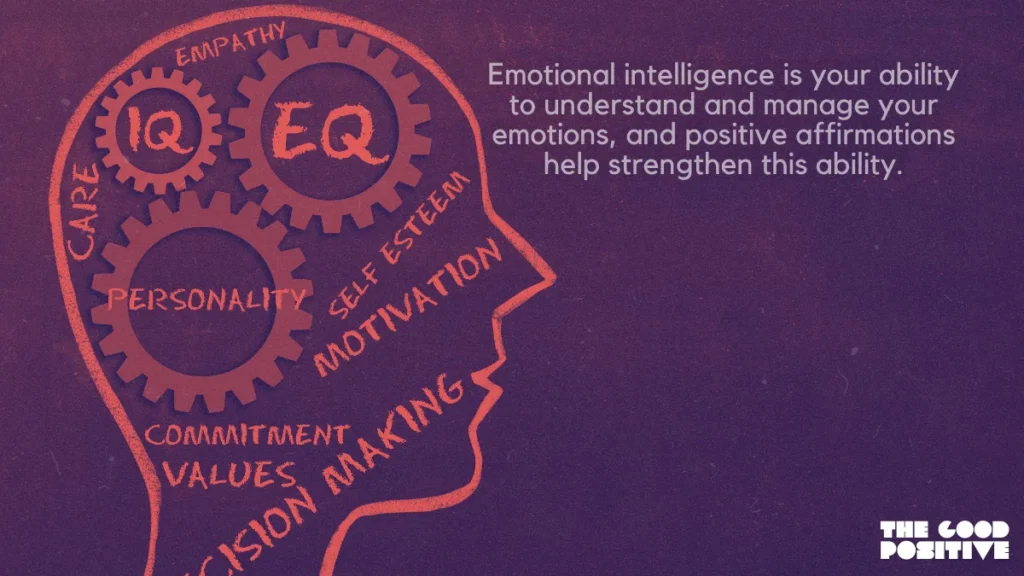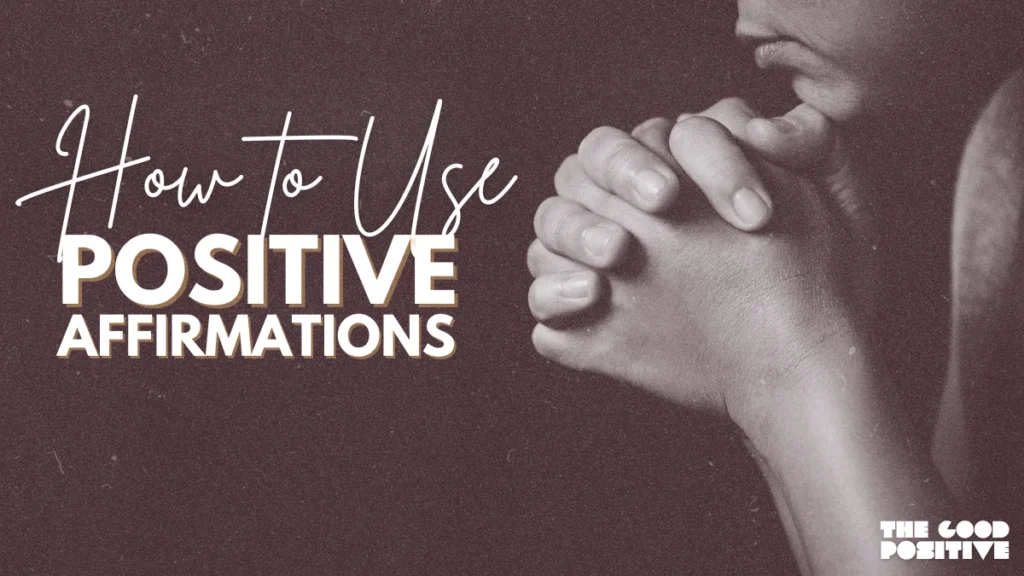Positive Affirmations for Emotional Intelligence can be a powerful tool in your journey towards understanding and managing your emotions more effectively.
Picture this: each morning, you start by affirming your strengths and embracing your challenges, setting the tone for a day filled with self-awareness and emotional control.
Whether you’re looking to enhance your empathy, boost your self-esteem, or simply navigate your emotional world with greater ease, incorporating affirmations into your daily routine can be a game-changer.
Ready to start? Here’s how affirmations can pave the way for a more emotionally intelligent you.
Table of Contents
Affirm More: Positive Affirmations for Epilepsy.
Why Use Positive Affirmations For Emotional Intelligence?

Imagine starting your day with a powerful, self-affirming statement: “I am calm and capable in the face of challenges.” This isn’t just feel-good chatter; it’s a strategic tool to enhance your emotional intelligence.
Emotional intelligence is your ability to understand and manage your emotions, and positive affirmations help strengthen this ability.
Here’s why they’re so beneficial:
- Fosters Self-Awareness: Daniel Goleman, a pioneer in emotional intelligence research, highlights self-awareness as a key component of EI. Regularly using affirmations encourages you to reflect on your feelings and behaviors, increasing self-awareness.
- Boosts Resilience: Consider the story of Maya Angelou, who overcame tremendous adversity through her belief in her own strength and worth. Affirmations like “I rise above difficulties” can embolden you to do the same, enhancing your resilience.
- Enhances Emotional Regulation: Neuroscientist Richard Davidson’s work shows that emotional regulation is crucial for well-being. Affirmations can act as mental rehearsals, preparing you to handle emotional situations with grace. For example, repeating “I control my reactions” can help you maintain your composure in stressful situations.
Using positive affirmations is more than just a daily morale boost; it’s a tool that aligns with the principles of emotional intelligence to enhance your daily interactions and internal dialogue.
Just as athletes visualize success to enhance performance, you can use affirmations to cultivate a healthier, more emotionally intelligent mindset.
Start incorporating them into your routine and watch your emotional agility grow!
100 Positive Affirmations For Emotional Intelligence

Imagine you’re holding a secret key that unlocks the door to understanding and managing your emotions better.
That’s exactly what these 100 positive affirmations for emotional intelligence offer—a simple, yet powerful way to enhance your daily life and interactions.
🔖 As you explore these affirmations, I encourage you to bookmark this page and commit to reciting them daily for the next 21 days.
This practice isn’t just about repetition; it’s about transforming the way you engage with yourself and the world around you. Ready to begin?
1. “I increase my emotional intelligence daily through self-reflection and learning.”
2. “My emotions are under my control, and I handle them with strength.”
3. “I am capable of perceiving and evaluating my feelings accurately.”
4. “My thoughts reflect a healthy approach to life’s challenges.”
5. “I express my emotions in a way that is respectful to myself and others.”
6. “I communicate with empathy and clarity.”
7. “I understand and interpret others’ emotions with sensitivity.”
8. “I respond to emotional signals from others with compassion and patience.”
9. “My self-confidence grows as I develop my emotional intelligence.”
10. “I embrace my emotional growth and celebrate my successes.”
11. “I perceive life’s complexities with great curiosity and intelligence.”
12. “I am independent and stable in my emotional responses.”
13. “My beliefs support positive behavior and healthy interactions.”
14. “I am aware of my feelings and manage them responsibly.”
15. “I influence my surroundings positively through my emotional stability.”
16. “I accept and appreciate the strength in my emotions.”
17. “I am capable of deep empathy and genuine connections.”
18. “My emotional intelligence gives me the power to overcome challenges.”
19. “I use my intelligence to foster positive relationships.”
20. “I control my impulses and act with thoughtful awareness.”
21. “My self-acceptance is strengthened by understanding my emotions.”
22. “I communicate my feelings in ways that build bridges, not barriers.”
23. “I responsibly handle the influence I have on others’ emotions.”
24. “My curiosity about people enriches my social interactions.”
25. “I am learning from my mistakes and becoming emotionally stronger.”
26. “I set healthy boundaries that foster my independence and growth.”
27. “I interpret emotional cues in myself and others with great care.”
28. “My life is richer because I am sensitive to the emotional atmosphere around me.”
29. “I am successful because I am attuned to the emotional needs of myself and others.”
30. “My awareness of my limitations informs my approach to personal development.”
31. “I control the expression of my emotions to maintain harmony.”
32. “I am curious about my feelings and explore them without judgment.”
33. “I value the intelligence it takes to manage complex emotions.”
34. “My emotional strength is a key component of my success.”
35. “I perceive and respond to emotional signals with precision and care.”
36. “My emotional intelligence facilitates deeper self-knowledge and self-acceptance.”
37. “I am capable of adjusting my behavior for better outcomes.”
38. “My thoughts and feelings are aligned with my goals for growth.”
39. “I communicate clearly to avoid misunderstandings and strengthen relationships.”
40. “I understand that empathy is a powerful tool for emotional connection.”
41. “I am responsible for my emotional well-being and that of those around me.”
42. “My sensitivity to the emotions of others enhances my influence positively.”
43. “I evaluate my emotional responses as part of my commitment to personal growth.”
44. “I express my emotions in ways that reflect my intelligence and understanding.”
45. “I am capable of great emotional stability, which supports my life’s ambitions.”
46. “My behavior reflects my deep respect for the feelings of others.”
47. “I believe in the power of emotions to transform and heal.”
48. “My healthy emotional expressions contribute to my overall success.”
49. “I control my responses to ensure they are appropriate and constructive.”
50. “I am capable of learning from every emotional experience.”
51. “I perceive challenges as opportunities for emotional growth.”
52. “I am independent in my thoughts but collaborative in my emotions.”
53. “My beliefs about emotions guide me towards healthier interactions.”
54. “I express my intelligence through the way I manage my feelings.”
55. “I communicate with intention and empathy, fostering understanding.”
56. “I understand the impact of my emotions on my behavior and decisions.”
57. “I respond to emotional challenges with a calm and balanced approach.”
58. “My success is supported by my ability to handle emotional complexities.”
59. “Life’s emotional lessons are valuable for my personal development.”
60. “My awareness of emotions helps me navigate social situations skillfully.”
61. “I am confident in my ability to interpret emotional cues correctly.”
62. “Self-acceptance is my response to understanding my emotional landscape.”
63. “I approach people with curiosity and an open heart.”
64. “My empathy is my strength in all my relationships.”
65. “I take responsibility for my emotional reactions and their consequences.”
66. “Learning from my limitations, I grow stronger each day.”
67. “I express my emotions in a way that respects my independence and stability.”
68. “My sensitivity to others’ feelings strengthens my social connections.”
69. “I am aware of my emotional triggers and manage them responsibly.”
70. “My curiosity about my own emotions leads to greater self-awareness.”
71. “I am successful because I manage my emotional reactions effectively.”
72. “Life teaches me new ways to express and understand emotions.”
73. “I am capable of using my emotional intelligence for personal and professional growth.”
74. “I communicate my needs and feelings clearly and respectfully.”
75. “Understanding my emotions helps me understand others better.”
76. “I respond to emotional situations with maturity and intelligence.”
77. “My growth in emotional intelligence is evident in every area of my life.”
78. “I perceive every emotional experience as a chance to learn and evolve.”
79. “My behavior is a testament to my emotional intelligence and self-control.”
80. “I am influenced by my emotions, but I choose how to express them.”
81. “I accept the challenges life throws at me with emotional courage.”
82. “My awareness of others’ emotions enhances my ability to empathize.”
83. “I am confident in my emotional responses and their positive impact.”
84. “Self-acceptance comes from recognizing and embracing all my feelings.”
85. “I approach emotional intelligence with the curiosity of a lifelong learner.”
86. “People appreciate my sensitivity and emotional understanding.”
87. “I take responsibility for fostering healthy emotional environments.”
88. “Mistakes in emotional judgment are stepping stones to better understanding.”
89. “I limit negative emotional influences by choosing positivity and growth.”
90. “My social skills are enhanced by my emotional sensitivity and intelligence.”
91. “I learn from every emotional encounter, improving my responses and strategies.”
92. “I express my feelings in a manner that is thoughtful and considered.”
93. “I am capable of navigating complex emotional landscapes with grace.”
94. “My beliefs about my emotional capabilities empower me daily.”
95. “I control the direction of my emotional growth through continuous self-reflection.”
96. “I communicate effectively, ensuring my emotional intentions are clear.”
97. “I understand the value of emotional experiences in shaping who I am.”
98. “I respond to life’s ups and downs with emotional resilience.”
99. “My stability in emotional intelligence guides me towards meaningful interactions.”
100. “I embrace each day as an opportunity to enhance my emotional intelligence.”
How to Use Positive Affirmations for Emotional Intelligence?

Imagine starting your day with a powerful declaration that sets the tone for how you interact with your emotions and the world.
That’s the magic of using positive affirmations to boost your emotional intelligence (EI). It’s like programming your mind to navigate the day’s emotional waves with grace and wisdom.
Here’s how to do it in five simple steps:
1. Choose Your Moment: Begin your day with affirmations. This could be after your morning alarm, during your commute, or as part of your meditation routine. The key is consistency.
2. Focus on Feelings: Craft affirmations that resonate with how you want to feel. For example, “I am calm and mindful in all situations,” emphasizes a desire to manage reactions and emotions.
3. Repeat with Intention: Speak your affirmations aloud, clearly and with conviction. This is not just about reciting words but feeling them deeply, visualizing the outcome.
4. Reflect and Adjust: At the end of the day, spend a few minutes reflecting on your emotional responses. Adjust your affirmations to better align with areas you feel need more attention.
5. Patience and Persistence: Emotional intelligence doesn’t develop overnight. It requires patience, practice, and perseverance. Keep at it!
How to Write Affirmations for Emotional Intelligence?
Writing effective affirmations for EI isn’t just about stating what you want to believe; it’s about crafting statements that guide your growth. Make sure your affirmations are:
- Personal and Positive: Use “I” statements that reinforce positive behavior and self-perception.
- Present Tense: Speak as if you already embody the trait, e.g., “I listen actively and empathize deeply.”
- Precise: Be clear about what emotional skills you are aiming to develop, avoiding vague or generic statements.
Embrace these affirmations as daily companions on your journey to emotional mastery. As they become a natural part of your routine, you’ll notice a more emotionally intelligent approach to both personal challenges and relationships.
FAQ’s

-
How do affirmations influence emotional stability and intelligence?
Affirmations can strengthen emotional stability and intelligence by reinforcing positive thinking patterns and self-belief. Regularly practicing these positive statements helps to rewire the brain, making it easier to manage stress and react more constructively in emotional situations.
-
How can I sharpen my emotional intelligence?
To enhance your emotional intelligence, start by observing how you react to people and situations. Practice active listening, empathy, and ask for feedback on your social interactions. Engaging in self-reflection and mindfulness exercises can also be incredibly effective in developing a deeper emotional awareness.
-
How can I get a high emotional IQ?
Achieving a high emotional IQ requires practice and dedication. Focus on improving your ability to understand and manage your own emotions, and recognize them in others. Improve your communication skills, seek new experiences, and maintain an open, curious mindset about people’s motives and behaviors.
-
Can affirmations increase intelligence?
While affirmations specifically may not increase cognitive intelligence, they can enhance emotional intelligence. By positively affirming your capabilities, you set a foundation for better emotional regulation, improved problem-solving in social contexts, and stronger interpersonal relationships.
-
What is emotional affirmation?
Emotional affirmation refers to positive statements that target your feelings about yourself and your emotional responses. These affirmations are designed to foster acceptance, confidence, and emotional resilience, helping you to manage your emotional reactions more effectively.
-
What is the positive impact of emotional intelligence?
High emotional intelligence significantly enhances your personal and professional relationships. It leads to better conflict resolution, greater empathy, and more effective communication. Additionally, individuals with high emotional intelligence are often better at handling stress and making decisions under pressure.
-
What are positive affirmations for improving emotional intelligence?
Positive affirmations for improving emotional intelligence are specific, empowering statements that target your ability to perceive, understand, and manage your emotions and those of others. These affirmations help reinforce your emotional skills and increase self-awareness.
-
How can I use affirmations to enhance my emotional intelligence?
To use affirmations for enhancing emotional intelligence, recite them daily, ideally in the morning or during a quiet moment when you can focus fully. Say them out loud, visualize their meaning, and believe in their power to effect change in your emotional responses and understanding.
-
What are the best affirmations for boosting emotional awareness?
Effective affirmations for boosting emotional awareness include: “I am attentive to my emotional responses,” “I handle my feelings with understanding and patience,” and “I am aware of others’ emotions and respond with empathy.”
-
Can positive affirmations really help in managing emotions better?
Yes, positive affirmations can significantly help in managing emotions better. By consistently affirming your ability to handle and understand your emotions, you reinforce a positive mindset that can lead to healthier emotional reactions and decisions under pressure.
-
How often should I repeat affirmations for emotional intelligence?
Repeat your affirmations for emotional intelligence at least twice a day—once in the morning to set the tone for the day and once at night to reflect on your emotional interactions and prepare for the next day. Consistency is key for the best results.
-
What are some examples of effective emotional intelligence affirmations?
Some effective emotional intelligence affirmations include: “I am capable of managing my emotions effectively,” “I listen to others with empathy and understanding,” and “Every day, I improve my emotional intelligence.” These affirmations help build confidence and foster growth in your emotional capabilities.
-
Are there specific affirmations for increasing empathy and sensitivity?
Yes, specific affirmations to increase empathy and sensitivity include: “I am open to understanding others’ perspectives,” “I feel deep empathy for the emotions of others,” and “I approach every interaction with sensitivity and compassion.”
-
How can I create my own affirmations to improve emotional intelligence?
To create your own affirmations, start by identifying areas of emotional intelligence you wish to improve, such as empathy, self-regulation, or social skills. Use positive, present-tense statements that reinforce your ability to achieve these goals, like “I am calm and thoughtful in stressful situations.”
-
What role do affirmations play in emotional intelligence training?
In emotional intelligence training, affirmations serve as a tool to reinforce and embed the desired emotional skills in your mindset. They help build self-confidence and awareness, making it easier to apply emotional intelligence principles in everyday interactions.
-
What are affirmations for emotional strength?
“I am resilient in the face of challenges.”
“I access my inner strength in times of need.”
“I overcome emotional obstacles with courage.”
“I remain positive even in difficult situations.” -
What are emotional affirmations?
“I accept and value my emotions as they guide my decisions.”
“I feel my emotions deeply and release them with ease.”
“I am at peace with how I feel.”
“I allow myself to fully experience my emotions.” -
What are affirmations for emotional independence?
“I trust my feelings and rely on my judgment.”
“I am responsible for my emotional well-being.”
“I maintain my emotional boundaries healthily.”
“I am self-sufficient in managing my emotions.” -
What are intelligence affirmations?
“I embrace challenges that sharpen my mind.”
“I am always open to learning and growing intellectually.”
“My mind is clear and focused.”
“I use my intelligence to solve problems creatively.” -
What are emotional stability affirmations?
“I maintain balance in my emotional state.”
“I am calm and centered, regardless of the situation.”
“I handle stress with grace and ease.”
“My emotions are stable and serve my highest good.”
Conclusion
As we wrap up our journey through the world of positive affirmations for emotional intelligence, remember that these simple phrases are the seeds of transformation.
Written to empower and enlighten, this article aims to be your guide in cultivating a richer, more emotionally intelligent life.
Embrace these affirmations daily, and watch as they gently reshape your world, leaving you smiling at the beauty of your own growth.
Here’s to brighter days ahead, filled with self-understanding and genuine connections! 💡✨
Affirm More: Positive Affirmations for Low Self-Esteem.

Aldvin is the proud owner of the great “thegoodpositive.com.” An affirmation writer and practitioner of positive habits. The law of attraction has helped him manifest self-love, health, and happiness. Now, he has plans to help others manifest a positive living! Know more. Follow: Twitter (X)

